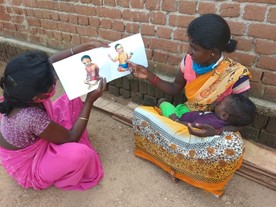Nutrimix and exclusive breast feeding gives Chapamuni’s premature infant a new life during during COVID-19
When 21-year old Chapamuni Marandi became pregnant in 2019, little did she know that she was going to give birth during an unusual time of a global pandemic. Chapamuni comes from the remote Dubrajpur village in Giridih, Jharkhand where she works in agriculture fields. Her husband, Shuklal Besra is a casual labour in Tamil Nadu who had a meager earning of INR8000/- per month. But with the outbreak of COVID-19, her husband had no other option but to return home.
On 31st July 2020, Chapamuni have birth to a premature baby girl. As Chapamuni herself has always been malnourished, her child was no different. The baby weighed only 1.8 kg at birth which is very lower than the normal birth weight, and needless to say that the child fell into severely acute malnourished (SAM) category. Added to this, she faced continuous pressure to go out and work in order to earn money for the family and therefore could not breastfeed her baby properly. Even Chapamuni’s husband was unable to provide adequate medical facilities to her and their child which led to further deterioration of their health. The large family of 11 members with limited source of income could not fulfill their basic needs properly.
Advocating knowledge and securing nutrition
Welthungerhilfe’s partner Abhivyakti Foundation’s nutrition officer Arti Kumari played a pivotal role in Chapamuni’s journey. Knowing that Chapamuni had given birth to a weak premature child and was herself was in a fragile state, Arti visited her and urged her to come and learn about health and nutrition during the World Breast Feeding Week in August 2020. Here, Chapamuni learned about the techniques of breastfeeding, kangaroo care and importance of the first 1000 days.
Arti also discussed with Chapamuni about her child’s health status and advised her for better post-natal care, including information about the exclusive breast feeding, balance diet and supported her with a balanced food basket with multigrain nutrimix – a nutritious baby food mix made from locally available resources. Arti along with trained ICDS workers Teresa Hemrom and Rosi Besara visited Chapamuni for regular counseling. They were successful in convincing Chapamuni and her family to visit the nearest government run Malnutrition Treatment Center (MTC) at the earliest for the well-being of the infant. Although there were some initial resentment, eventually they agreed.
Chapamuni with her child went to the MTC Center and got admitted. Here, the pediatric doctor prescribed her calcium syrup and exclusive breastfeeding. Following this, Chapamuni’s daughter gained 200 gm weight with a month. She and her family realised the importance of access to correct information and proper care but also understood that securing health and nutrition is possible even with poor financial condition and limited means of livelihood.

A young mother promising a healthier environment for her child
Pinki Tudu married Manoj Murmu when she was only 18years old. Manoj is a daily wage labourer who works in agriculture fields and they are residents of Harladih village, Bengabad, Giridih, Jharkhand. Poor economic condition, becoming a mother at a very young age and lack of healthy nutritious food led the family to slowly drown into the clasps of malnutrition.
Pinki’s story of struggle and determination
Already undernourished and slightly built, Pinki Tudu gave birth to a baby boy, Abir with one year of her marriage. At birth Abir weighed was much lower than the normal birth weight.Very soon Pinki had to return for work as she left the child at the care of the family. She could not breastfeed the child regularly due to various household chores and work pressure. Eventually, Abir’s health was compromised and he had to depend on goat milk or cow milk as per its availability. Pinki was already weak and the current situation worsened her and Abir’s condition.
Nuni Kisku, a nutrition volunteer of Welthungerhilfe’s partner Abhivyakti Foundation, along with Anita Hembram – an Anganwadi worker, visited Pinki’s house and witnessed the fragile health condition of Abir. Pinki was then counseled on the vitality of exclusive breastfeeding upto 6 months, and post-natal care. Besides this, she and her family were also counseled on how they could grow kitchen gardens in limited ares to ensure nutritious food and could also earn money by selling the extra produce. They were urged to be attend AVF’s Participatory, Learning and Action (PLA) meetings on securing holistic nutrition and health.
Despite the obstacles created by her family and the society dissuading her from attending these meetings, Pinki was confident to take this effort for the sake of her child – Abir. She attended the meetings regularly after work.
Today, Pinki and Abir’s health status has improved impressively, and Abir is in the normal weight category. During the meetings, she not only learned about importance of nutrition but also on WASH, nutritious recipes, and feeding and care giving practices. She also regularly attended every Village Health, Sanitation and Nutrition Day (VHSND) sessions in the ICDS center and tested her hemoglobin levels. During VHSND, she also tracked her child nutritional status through growth chart and time to time immunization as per the mother-child protection (MCP) card.
After Abir was 6 months old, Pinki started complementary feeding and fed him the right amount of rice, pulses, eggs and vegetables at appropriate intervals. She also gained knowledge on nutrimix – a multi grain mixture prepared from locally available ingredients including millets. Nuni Kisku, trained her on how to prepare nutrimix and feed it regularly to Abir.
Pinki stood up for the well-being of her child despite the obstructions she received from others. And now both Pinky and Abir are leading a healthier life.





